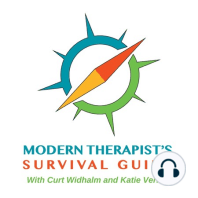32 min listen

Understanding the Psychological Impacts of Leaving Afghanistan, Part 2: Afghan Americans
FromThe Modern Therapist's Survival Guide with Curt Widhalm and Katie Vernoy
Understanding the Psychological Impacts of Leaving Afghanistan, Part 2: Afghan Americans
FromThe Modern Therapist's Survival Guide with Curt Widhalm and Katie Vernoy
ratings:
Length:
39 minutes
Released:
Aug 24, 2021
Format:
Podcast episode
Description
Understanding the Psychological Impacts of Leaving Afghanistan, Part 2: Afghan Americans An interview with Sara Stanizai, LMFT, on how Afghan Americans are responding as the US leaves Afghanistan. Curt and Katie talk with Sara about her experience as an Afghan American therapist, looking at the misconceptions, lack of knowledge, and bias that can harm Afghan American clients. We look at clinical best practices for immigrants to the US, as well as some of the history and cultural norms of the country, the uniqueness of the experience, and the importance of finding primary sources to understand what is really going on. Sara also shares ideas for what we can do to support the Afghan people in Afghanistan and the diaspora at this time. It’s time to reimagine therapy and what it means to be a therapist. To support you as a whole person and a therapist, your hosts, Curt Widhalm and Katie Vernoy talk about how to approach the role of therapist in the modern age. Interview with Sara Stanizai, LMFT Sara Stanizai, LMFT (she/her) is a licensed therapist, clinical supervisor, and the owner of Prospect Therapy, a queer- and trans-affirming therapy practice based in Long Beach, CA, with a special focus on serving first-generation American and immigrant communities. A queer first-gen herself, Sara’s clinical and professional work focuses on serving the Afghan diaspora, specifically, fellow Afghan-American women, and bicultural communities in general. She runs a weekly Afghan-American women's group and will be offering this free of charge in the coming weeks to meet the mental health needs of her community. In addition to running her group practice, she is on the Board of Directors of the Los Angeles Bisexual Task Force, a 501c3 organization that champions education, advocacy and visibility for the bi+ communities of greater Los Angeles. She is a certified cognitive therapist through the Academy of Cognitive Therapy and holds an advanced certificate in transgender affirming therapy from Widener University. She completed her MA in Clinical Psychology from the Chicago School of Professional Psychology and her undergraduate degree at Mount Holyoke College. In this episode we talk about: Sara’s experience being an Afghan American, especially since 9/11; as well as her response to the US withdrawal from Afghanistan Afghan Americans: the displaced among the displaced The real issues that folks in Afghanistan are facing, separate from the perspective of western cultural and the differences in the Afghan American experience Historical context for Afghanistan and the memories of Afghan Americans that shape their views: Culture, art, progressive, beautiful, diverse Not feeling Afghan enough or American enough The value of hospitality and how Afghanistan will always welcome Afghan Americans How Islam intertwines (but is not equivalent) to the Afghan culture Modesty and values and the bias toward Muslim women who wear headscarves Bias and misperceptions that can negatively impact clients The complexity of Islam and how it can be perceived both as beautiful and nature-loving as well as dangerous and militant The challenge to identity being an Afghan American The danger of pity coming into the therapy room The importance and nuance of educating yourself outside of the therapy room, while also encouraging the client of sharing their own experience. Not: What does this mean? Instead: What does this mean to you? The Afghan culture requires offering 3 times before determining that the answer is no Collectivism and the importance of family Impact of intergenerational trauma and military involvement in a home country Seeking out primary sources, with a focus on Afghan voices as the experience is truly unique Avoid sensationalized headlines and images Challenging what has been “truth” especially when looking at these sensationalized stories Ways of healing and clinical practice that are better aligned to these clients Prayer and healing within safe community s
Released:
Aug 24, 2021
Format:
Podcast episode
Titles in the series (100)
Managing Your Online Reputation: Curt and Katie talk about navigating through negative Yelp Reviews, Google Searches, and Therapist Facebook Groups by The Modern Therapist's Survival Guide with Curt Widhalm and Katie Vernoy